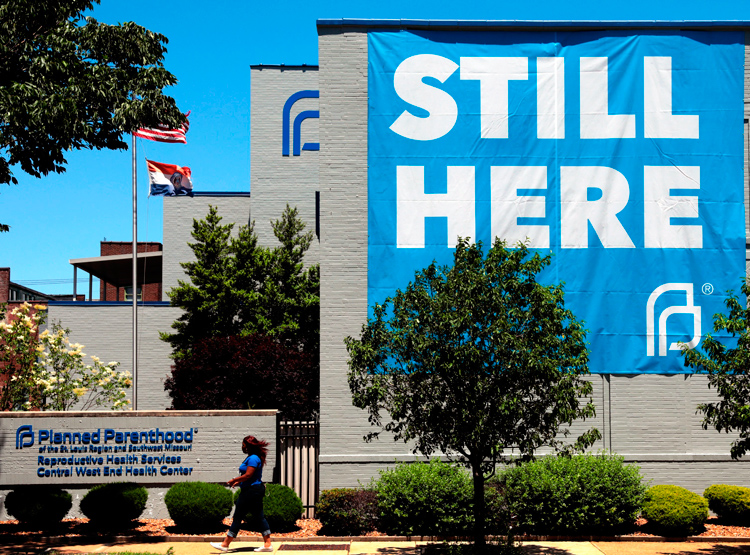Supporters of women’s right to choose whether to have an abortion registered an important victory May 29 when the state government’s attempt to shut down Missouri’s only remaining abortion clinic was blocked. The Planned Parenthood clinic in St. Louis now has its annual license to operate. Their office is festooned with a giant banner reading, “Still here.”
This victory ends — at least for now — a yearlong battle between the clinic and Gov. Mike Parson’s administration. When the clinic’s operators filed to renew their license last year, the state’s health department refused, claiming to have uncovered “serious and extensive” problems during its annual inspection. After seizing the medical records of over 4,000 women who had abortions at the clinic since 2018, the state inspectors claimed they had turned up four instances of what they called “failed abortions.”
Planned Parenthood appealed the decision and a judge allowed the clinic to provide abortions while the case was fought out. This led to an administrative hearing last October followed by a review of records submitted by the clinic. Administrative Hearing Commissioner Sreenivasa Rao Dandamudi issued a ruling May 29 that the St. Louis clinic in fact meets the requirements, and ordered their license renewed.
“We have no concerns with the substance of Planned Parenthood’s quality assurance review, and there are no other indications of deficient practices,” Dandamudi said.
Alexis McGill Johnson, CEO of Planned Parenthood Federation of America, hailed the decision as a “hard-fought victory.”
In addition to having only one provider in the state, laws pushed through the Missouri legislature require women seeking an abortion to undergo in-person compulsory “counseling” aimed at intimidating them, as well as waiting periods, insurance coverage only when the woman’s life is endangered, a ban on using telemedicine for medical abortions, parental consent for minors and more.
“The data shows that many have already paid the price, with the vast majority of Missouri patients forced to cross state lines to get the care they need,” McGill Johnson said. “This is what it looks like when abortion is a right in name only.”
Last year Parson signed a law banning all abortions after eight weeks, with the only exception being if the woman’s life is in danger. A federal judge blocked the law from going into effect, holding it was a violation of the Supreme Court’s 1973 Roe v. Wade decision making abortion legal.
In addition to Missouri, there are five other states where there is only one abortion provider. Opponents of women’s right to choose have been making gains in limiting access to abortion, with the ultimate goal of criminalizing the procedure once again.
At the same time, public support for the right to abortion is at a solid 61%, higher than it’s been over the two and a half decades since the Pew Research Center has conducted polls.
This support was registered in Kentucky, where the clinic in Louisville — the only one in the state — was vandalized and its front smashed May 29. Supporters and clinic escorts put out an appeal to raise $100,000 for repairs. In only two days more than $114,000 came in from 3,000 contributors. One donor sent in $100 “in honor of Breonna Taylor,” an African American health care worker in Louisville who was shot to death in her bed by Louisville cops March 13. Donations came from across the U.S., and from Canada, Denmark, Finland and the United Kingdom.
Growing international support
Growing support for abortion rights has been registered around the world in recent years. They have all been won by broad and sustained public mobilizations in the streets, most of them led by young women.
The movement in Ireland won a national referendum and pushed the government to legalize abortion for the first time ever, in 2019. In March, the New Zealand Parliament decriminalized abortion after many decades of tireless work by women’s rights stalwarts.
In Argentina hundreds of thousands have marched and rallied over the past few years, pushing President Alberto Fernández to promise to introduce a bill in parliament to legalize abortion. He backed off earlier this year, saying the coronavirus outbreak meant it would have to wait, but leaders of the campaign say they will be back in the streets if he doesn’t act quickly.
Hundreds of thousands of young women are getting experience with mass protest today as they join actions against the cop killings of Taylor, George Floyd and many others, and the vigilante killing of Ahmaud Arbery. This bodes well for the fight to defend women’s right to choose abortion.
It also bodes well for the needed political fight to put the movement on the right footing. Women’s right to choose abortion is not a “health issue,” as it’s treated in Roe v. Wade, with provisions that can and are being used to weaken abortion rights around fetal viability and the need for doctors’ consent. Instead, it’s a question of the equal protection for women under the Constitution. “My body, my choice.” Period.


